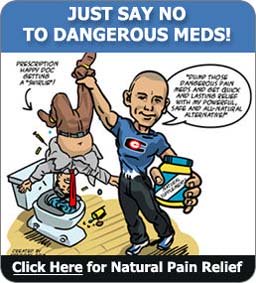What Caffeine Side Effects
Should You Worry About?
Are you worried about Caffeine Side Effects? Well, we're here to set the record straight as to whether reaching for a cup of coffee first thing in the morning is a dangerous habit... or not. We know that caffeine makes us alert and ready to start the day, but what else is it doing to our bodies, and should we be concerned about the side effects of caffeine or coffee?
Drug Interactions are Common
One little known problem with caffeine are some common drug interactions that can be problematic in many people(7). You see, caffeine is eliminated from the body with the help of a group of enzymes called Cytochrome P450, which, interestingly, is also the reason for Grapefruit Juice Side Effects, and why you should limit or avoid grapefruit juice if you drink caffeine.
These enzymes also help to eliminate many drugs as well, so when these drugs that use these enzymes are taken with caffeine, there may not be enough to detoxify both the drugs and the caffeine. Levaquin Drug Interactions are a problem with caffeine, as are many common drugs, such as:
- Most over the counter pain relievers
- Acid Reflux Medications
- Many heart drugs
- Albuterol and Theophylline
This Table of Drugs Metabolized by Cytochrome P450 includes almost 50% of drugs on the market . So if you take any prescription or over the counter drugs, it's extremely likely that your drugs might interact with caffeine, which could lead to problems taking those drugs.
Inability to clear the drugs could also buildup of those drugs, or a buildup of caffeine in your system over time, depending upon the health of your P450 enzyme system. For example, some people taking caffeine along with a class of antibiotics called the Fluoroquinolones have reported heart palpitations, anxiety, and panic attacks that persist when taking caffeine even years after taking the antibiotics!
Stimulation and Alertness
Are Main Caffeine Side Effects
For most people, drinking a cup of coffee helps them to get some alertness and energy in the morning, but drinking an excessive amount of coffee (or a really strong cup like an espresso) can cause us to become jittery and anxious, and even cause our heart to race. Many can't drink coffee at night because it can cause insomnia from the stimulation, and some studies have associated caffeine intake with a less restful sleep.
Caffeine is considered a stimulant because it speeds up our central nervous system. While many find this effect desirable, and some studies have shown it to be beneficial for our mental energy, increasing alertness, attention and cognitive function. Caffeine side effects have even been “associated with less depressive symptoms, fewer cognitive failures, and lower risk of suicide”. (1)
Caffeine Side Effects
Linked to Anxiety
The side effects of caffeine also trigger the release of several types of hormones including adrenaline and norepinephrine which cause a “fight or flight” response in the body. That’s why coffee drinkers get a burst of energy and alertness after just one cup. But at the same time this effect can also causes agitation, irritability, and anxiety.
One study found with their test subjects that drinking more than 1,000 mg of caffeine in a day had symptoms almost identical to anxiety disorder, and recommended that psychiatrists inquire about caffeine intake in their patients to ensure they are treating a true anxiety disorder and not simply excessive caffeine intake!(2)
Green tea, however, contains both caffeine and a substance called theanine. The theanine counteracts the caffeine with a relaxation response, while improving concentration, focus, and awareness. Buddhist monks are famous for their use of green tea to give them a feeling of 'relaxed alertness'.
If you suffer from the effects of caffeine or find it too stimulating, be sure to check out the page on Green Tea Side Effects to see if switching to green tea or, my favorite, matcha green tea, would be a better option for the those who like the benefits of caffeine, but wish to avoid the problems associated with it.
High Blood Pressure and Dehydration
Many worry that drinking too much caffeine will cause long-term effects to their heart… this however is not the case. True, caffeine does cause a small spike in blood pressure, but this wears off and there is no real future risk of high blood pressure. When caffeine is ingested through coffee or tea, the risk seems to be even less. (3)
However, in rare cases some have overdosed on caffeine and experienced rapid or irregular heartbeat and trouble breathing. Although this is not a normal occurrence, it’s best to stay away from caffeine if you already have heart related problems.
Caffeine is widely known to have a diuretic effect, meaning that you might urinate more frequently after taking caffeine, which is why it doesn’t really quench your thirst to drink coffee. It's possible this is why high blood pressure is not an issue with caffeine, since diuretic medications are often used to treat high blood pressure anyway.
If caffeine is taken in pill form, this diuretic effect can be problematic, but because caffeine is usually taken as a liquid in coffee or tea, it has a 'net neutral' effect. It shouldn't be counted towards one's daily fluid intake, but it also doesn’t cause dehydration. (4)
However, caffeine also has the effect of relaxing bladder muscles, causing some to urinate more frequently. So, it might seem as if there is more fluid loss than there really is simply because caffeine side effects make it so you are unable to hold as much urine in your bladder before you 'have to go'. This effect on the bladder means that those with frequent urination or painful bladder conditions such as interstitial cystitis should avoid caffeinated beverages.
But Isn't Coffee Good for You?
All of these caffeine side effects may seem to conflict with what you may have heard before about the health benefits of coffee. So, is coffee good for you, or not? In reality, coffee can be beneficial to your health, if not taken in excess, because it is rich in antioxidants. In fact, up to 25% of the daily intake of many Americans comes from their coffee intake!
Surprisingly, those who drink coffee have a reduced risk of developing diabetes even up to 67%. (5) It can also diminish the risk of liver diseases by up to 84%. Additionally, daily coffee drinkers can lower their risk of liver cancer up to 40%.(6) That seems like it might be good enough reason not to give up drinking coffee unless you experience negative side effects of caffeine.
As we can see, although caffeine may have some promising stimulating effects, and coffee and tea have some antioxidant benefits unrelated to the caffeine, there is a definite negative side that many experience. Their seems to be a 'Goldilocks Range' at which coffee can be beneficial, while avoiding caffeine side effects. And even if caffeine bothers you, you might find that green tea is a better choice and causes fewer problems.
On the plus side, we have the ability to properly regulate how much caffeine we ingest and be able lessen our chances of experiencing caffeine side effects such as jitteriness, anxiety, and sleep deprivation. They key is understanding how much is too much.
Resources:
- Caffeine, mental health, and psychiatric disorders Neuropsychiatric effects of caffeine
- Neuropsychiatric effects of caffeine
- Blood pressure response to chronic intake of coffee and caffeine: a meta-analysis of randomized controlled trials
- Caffeine ingestion and fluid balance: a review.
- Coffee consumption and risk of type 2 diabetes mellitus
- Coffee, cirrhosis, and transaminase enzymes
- Clinically Significant Pharmacokinetic Interactions Between Dietary Caffeine and Medications





